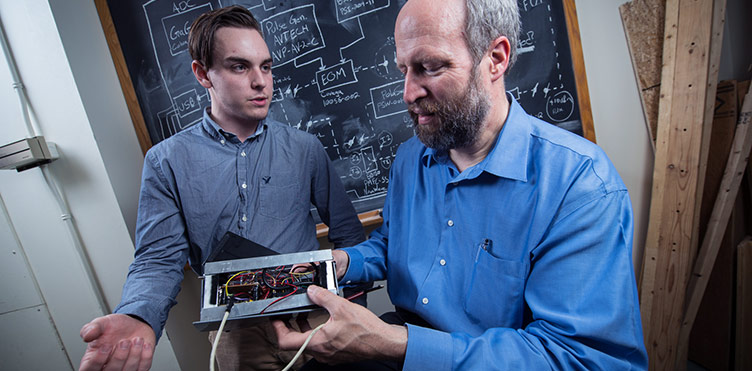
Three New Brunswick post-secondary institutions are moving into outer space with the province’s first cube satellite, with the help of the Canadian Space Agency.
UNB, NBCC and Univerisité de Moncton have banded together to launch this collaborative project from the International Space Station in 2021.
CubeSat NB is one of 15 teams participating in the project. This new satellite is designed to provide insights into the behaviour of the earth’s ionosphere, which is part of the upper atmosphere.
“We’re excited to be working in co-operation with New Brunswick institutes for the development of a cube satellite,” says UNB’s project engineer Troy Lavigne. “It’s necessary that we work closely with each other and leverage the strongest attributes of each institute to make this mission a reality.”
Similar to a GPS, CubeSat will receive signals transmitted by a global navigation satellite system while it travels through the ionosphere. Researchers will then be able to use this information to track changes that occur over time and observe how it responds to space weather.
CubeSat is designed with robust custom software and hardware developed to transmit mission data; manage power consumption and solar battery charging; temperature sensing and thermal management; antenna and solar panel deployment; timekeeping; security; file management and fault protection.
Inside the satellite are three spectral cameras. Two cameras will allow researchers to study distribution of oxygen in the upper atmosphere, capturing images of the red and green light oxygen atoms given off during aurora and airglow events. The third camera will take images of the Earth’s surface for earth science and meteorology applications.
The building and operating of CubeSat NB will involve a large number of engineering, science and technology students in New Brunswick. This project will give students an opportunity to play a leading role in the development of the physical design and in the fabrication and programming of sophisticated computers needed to successfully launch and operate the satellite.
“NBCC is excited to be involved in the applied research and innovation CubeSat NB project in collaboration with our partners at UNB and Université de Moncton,“ says Saadmaan Rahman, NBCC Electronics Engineering Technology Instructor and co-principal investigator on the project.
“Inspiring learners to discover the benefits of engineering and technology education is the primary goal of our efforts in this project.”